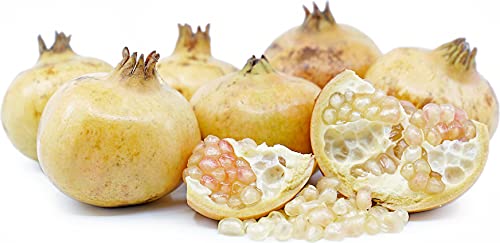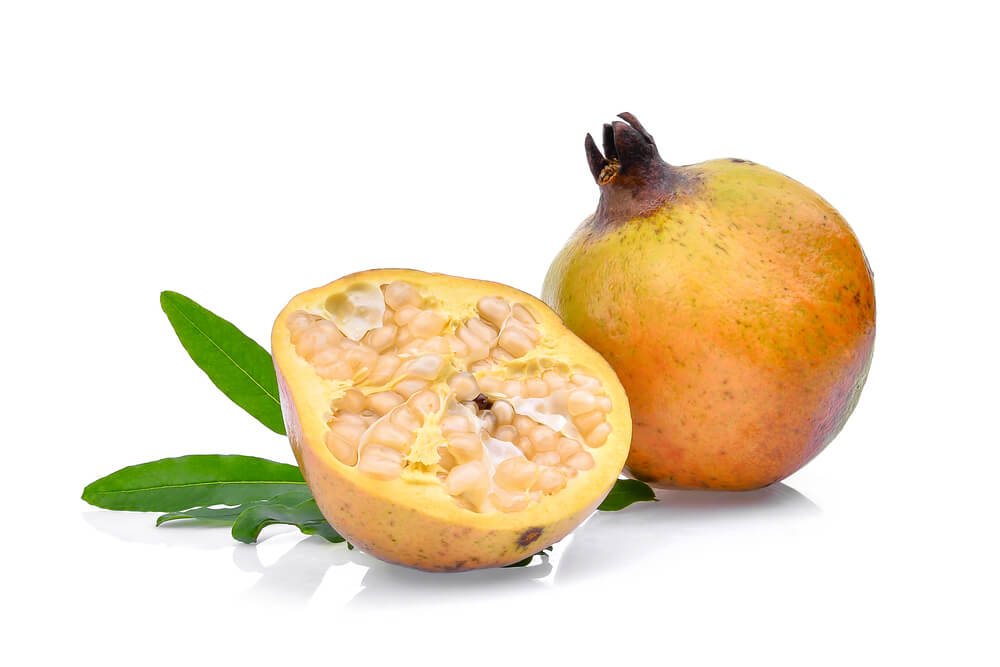Have you ever heard of white pomegranates? These unique fruits are gaining popularity for their stunning appearance and health benefits. In this article, we will delve into the world of white pomegranates, unraveling their secrets and exploring their fascinating qualities. So, grab a seat and get ready to discover all you need to know about these delightful fruits!
Table of Contents
What Are White Pomegranates?
White pomegranates are a rare variant of the traditional red pomegranate. While their red counterparts are well-known, white pomegranates stand out with their pale yellow or light green skin. And it doesn't stop there – the interior arils of white pomegranates are also white or pale pink, creating a visually captivating contrast. It's important to note that these unique fruits are not genetically modified; they are a natural variation that occurs in some pomegranate trees.
Nutritional Value of White Pomegranates
White pomegranates are not just pleasing to the eye; they also offer a host of nutritional benefits. They are packed with antioxidants, vitamins, and minerals that contribute to overall health. Antioxidants play a vital role in protecting our bodies from harmful free radicals and reducing the risk of chronic diseases. White pomegranates are a rich source of vitamin C, which supports a healthy immune system and collagen production for beautiful skin. Additionally, they contain dietary fiber, aiding in digestion and promoting a feeling of fullness.
Key Features:
- High in antioxidants: White pomegranates, like their red counterparts, are a rich source of antioxidants. These powerful compounds help protect our bodies from harmful free radicals, which can cause damage to our cells and lead to various diseases.
- Abundance of vitamins: White pomegranates are loaded with vitamins, including vitamin C, vitamin K, and several B vitamins. Vitamin C is known for its immune-boosting properties, while vitamin K plays a crucial role in blood clotting and bone health.
- Rich in minerals: White pomegranates contain essential minerals like potassium, calcium, and iron. These minerals are vital for maintaining proper bodily functions, including heart health, nerve function, and oxygen transport within the body.
- Dietary fiber: White pomegranates are a good source of dietary fiber, which is essential for a healthy digestive system. Fiber helps regulate bowel movements, prevents constipation, and promotes a feeling of fullness, which can aid in weight management.
Nutritional Value Table:
Here's a breakdown of the nutritional value of white pomegranates per 100 grams:
| Nutrients | Amount |
|---|---|
| Calories | 83 |
| Protein | 1.7 grams |
| Fat | 1 gram |
| Carbohydrates | 19 grams |
| Fiber | 4 grams |
| Vitamin C | 10 milligrams |
| Calcium | 10 milligrams |
| Iron | 0.3 milligrams |
It's important to note that these values may vary slightly depending on the specific variety and ripeness of the white pomegranate.
Also Read: White Oak Bark – Benefits, Dosage, Side Effects, and More
Health Benefits of White Pomegranates
White pomegranates offer numerous health benefits, thanks to their unique nutritional profile. Here are some of the key advantages of consuming white pomegranates:
- Boosts the immune system: White pomegranates are rich in vitamin C, which helps strengthen the immune system and fight off infections and illnesses.
- Anti-inflammatory properties: The antioxidants found in white pomegranates have anti-inflammatory effects on the body, potentially reducing inflammation and associated health issues.
- Supports heart health: White pomegranates contain compounds that may help lower blood pressure and reduce the risk of heart disease by improving cardiovascular function.
- Promotes better digestion: The fiber content in white pomegranates aids in digestion and can help regulate bowel movements, preventing constipation and promoting a healthy gastrointestinal system.
- Supports weight management: With their high fiber content and low-calorie count, white pomegranates can help you feel fuller for longer, making it easier to manage your weight and prevent overeating.
- Potential cancer-fighting properties: Some studies suggest that white pomegranates may have anticancer effects due to their antioxidant content. They may help inhibit the growth of certain cancer cells, although more research is needed.
Incorporating white pomegranates into your diet can provide these health benefits and more. With their delicious taste and numerous advantages, they are an excellent addition to a balanced and nutritious eating plan.

Culinary Uses of White Pomegranates
White pomegranates are incredibly versatile when it comes to culinary applications.
Their mild and slightly sweet flavor complements a wide range of dishes.
Here are some creative ways to incorporate white pomegranates into your culinary repertoire:
- Salads:
– Add a pop of freshness to your salads by sprinkling white pomegranate arils on top.
– They not only provide a delightful crunch but also enhance the visual appeal of your dish.
– Combine them with greens, nuts, and cheese for a delicious and nutritious salad. - Desserts:
– White pomegranates can be a delightful addition to various desserts.
– Use them as a topping for cakes, cupcakes, or ice cream to add a burst of flavor and texture.
– Incorporate them into fruit salads, parfaits, or even as a filling for pastries and tarts. - Beverages:
– Create refreshing and flavorful beverages with white pomegranates.
– Blend them into smoothies for a healthy and vibrant drink.
– Infuse them into water, lemonade, or iced tea for a subtle and refreshing twist. - Sauces and Dressings:
– Experiment with white pomegranates to make unique sauces and dressings.
– Blend them with herbs, vinegar, and olive oil to create a tangy and delicious salad dressing.
– Use them as a base for fruity sauces that pair well with grilled meats or roasted vegetables. - Cocktails:
– White pomegranates can elevate your cocktail game with their distinct flavor.
– Muddle them with fresh herbs and mix them into your favorite alcoholic beverages for a refreshing twist.
– Garnish your cocktails with white pomegranate arils for an elegant and visually appealing touch.
Remember, the possibilities with white pomegranates are endless. Get creative in the kitchen and explore new ways to enjoy their unique taste and texture. From salads to desserts, these white gems are sure to impress your taste buds and enhance your culinary creations.
How to Select and Store White Pomegranates
When it comes to enjoying the deliciousness of white pomegranates, selecting the right ones is essential. Here are some tips to help you choose the best white pomegranates and store them properly:
1. Look for Ripe and Quality Pomegranates
To ensure you get the most flavorful white pomegranates, it's important to select ripe and quality fruits. Follow these guidelines:
- Weight: Pick up the pomegranate and feel its weight. Ripe white pomegranates tend to be heavier as they are filled with juicy arils.
- Skin: Examine the skin of the white pomegranate. It should appear firm and free from any cracks or blemishes.
- Color: While white pomegranates have a lighter skin tone, look for a pale yellow or light green color. Avoid pomegranates that have a dull or brownish hue.
2. Assess the Skin Condition
The condition of the skin can provide useful information about the freshness and ripeness of the white pomegranate:
- Intact Skin: Choose pomegranates with an intact skin. Avoid fruits with cuts, bruises, or any signs of damage, as they may indicate spoilage or dehydration.
- Smoothness: Run your fingers gently over the skin. Ideally, it should feel smooth and taut, without any wrinkles or soft spots.
3. Store White Pomegranates Properly
Once you have selected your white pomegranates, it's crucial to store them correctly to maintain their freshness and flavor. Follow these storage tips:
- Cool and Dry Place: Place the white pomegranates in a cool and well-ventilated area, away from direct sunlight. A pantry or cellar can be an ideal storage spot.
- Avoid Moisture: Keep the white pomegranates away from areas with high humidity, as excessive moisture can cause them to spoil quickly.
- Do Not Refrigerate Unripe Pomegranates: If the white pomegranates you purchased are not fully ripe, leave them at room temperature to ripen. Once they reach the desired ripeness, you can transfer them to the refrigerator.
- Refrigeration: White pomegranates can be stored in the refrigerator to extend their shelf life. Place them in a breathable bag, like a perforated plastic bag or a paper towel, to prevent excess moisture buildup.
4. Shelf Life of White Pomegranates
White pomegranates can stay fresh for up to two weeks when stored properly. However, their freshness may vary depending on their initial ripeness at the time of purchase. It's always best to consume them as soon as possible to enjoy their optimal taste and texture.
Where to Find White Pomegranates
While white pomegranates may not be as prevalent as their red counterparts, you can still find them if you know where to look. Check out local farmers' markets, specialty grocery stores, or online suppliers.
Keep in mind that white pomegranates may be more readily available during their peak season. If you're having trouble finding them, don't hesitate to inquire with local suppliers or growers for potential sources.
Interesting Facts About White Pomegranates
Here are some intriguing and lesser-known facts about white pomegranates:
- White pomegranates have been referenced in ancient cultures, such as in Greek mythology, where they were associated with the goddess Persephone.
- In some traditions, white pomegranates are considered a symbol of purity, fertility, and new beginnings.
- The white pomegranate variety is believed to be rarer than its red counterpart, making it more of a novelty.
- White pomegranates are often used in special occasions and celebrations due to their unique appearance and symbolic meaning.
- The pale color of the arils in white pomegranates gives them an ethereal and delicate aesthetic, perfect for adding visual appeal to dishes.
- Like red pomegranates, white pomegranates are packed with antioxidants and nutrients that offer numerous health benefits.
- White pomegranates have a slightly milder flavor compared to red pomegranates, making them a versatile ingredient in a wide range of recipes.
- The cultivation of white pomegranates requires specific conditions, including the right soil pH and adequate sunlight, contributing to their rarity.
- White pomegranates have gained popularity among chefs and food enthusiasts for their unique color and flavor profile.
- Trying white pomegranates can be an exciting and delightful experience, offering a new twist on the traditional pomegranate variety.
White pomegranates are more than just a pretty face – they offer a range of health benefits and culinary delights. From their nutritional value to their potential to prevent diseases, these unique fruits are worth exploring.
Remember to select and store them properly to enjoy their freshness for longer. So, whether you're looking to boost your health or add a touch of elegance to your meals, don't miss out on the beauty and benefits of white pomegranates. Dive into this delightful fruit and discover a world of wonders!
Must Read: Unlocking the Power of Red Raspberry Seed Oil: Your Ultimate Sun Protection Solution


